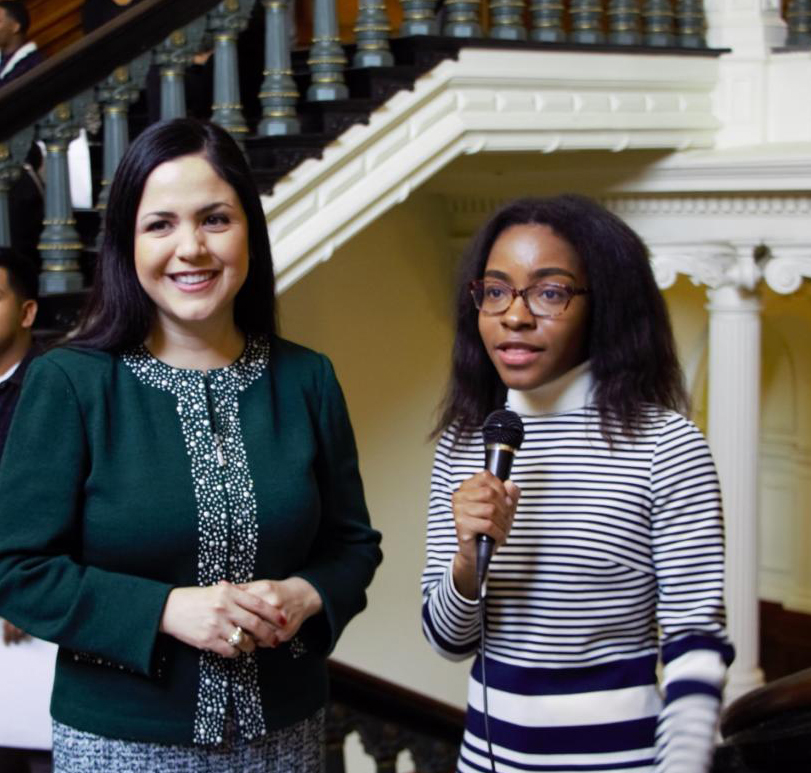Working with state lawmakers for the future of public education
With the 86th Texas Legislative Session officially underway this week, the Houston Independent School District is hitting the ground running to make its voice heard among lawmakers.
Armed with a thoughtfully crafted legislative agenda, district leaders aim to influence policy decisions on reforming school finance and reducing recapture, improving school safety and security, and addressing accountability ratings and sanctions.

Wisdom High School senior Belinda Obasi interviews state Rep. Ana Hernandez on the opening day of the 86th Texas legislative session.
Wisdom High School Senior Class President Belinda Obasi was one of 50 students from eight schools who accompanied HISD leaders to Austin for the opening day of the session. The goal was to get a sense of what the legislative process entails and how discussions with lawmakers can impact decision-making at the state level.
Belinda also reports for Wisdom’s TV news and on the school’s news website. She was able to interview two state representatives – Carol Alvarado and Ana Hernandez – to get their insights on this year’s session.
Belinda said it was a fun and exciting way to see how our government works and it was a great privilege to get their viewpoints on public school finance reform. In Belinda’s words, “They made me feel like my voice was being heard.”
Even when working on policy from the district level, we can Include our students and make it part of the learning process about how our government works and how we each can be involved.
You can read more about the students’ experience here.
School finance
Under the state’s public education funding structure and despite nearly 80 percent of HISD students coming from low-income families, HISD is considered “property-wealthy” and is subject to a recapture payment to the state under Chapter 41 of the Texas Education Code, commonly known as the Robin Hood law.
Recently, Texas Gov. Greg Abbott said Texas must fix school funding this session and put Robin Hood school funding on a path to extinction. As a school district with an estimated $272 million recapture payment due to the state for 2018-2019 and payments expected to rise in the years to come, this couldn’t be more pressing for HISD.
Many components of today’s school finance system have been in place for over three decades. It’s time to come up with a solution on how to equitably fund our public schools, and I am confident we can get that done this legislative session.
School safety
Along with adequately funding public schools, the safety of our students is of the utmost importance. While HISD is using local dollars to implement practices that are aligned with state recommendations, additional state funding would enable the district to increase active-shooter emergency drills, officer training, safety infrastructure, and mental health supports.
Our top priority is to ensure a safe environment for students and their parents to feel secure while learning is underway in our classrooms.
Accountability ratings and sanctions
Finally, HISD is addressing the need to adjust state accountability ratings and sanctions. A one-size-fits-all approach is detrimental to districts such as HISD, which has varied populations and unique cultures from campus to campus.
A consistent and fair accountability rating system is an important tool for truly measuring student achievement. I urge lawmakers to consider improvements to the new A-F rating system, taking in account the challenges that face large, urban school systems like HISD, as well as creating a system that does not rely heavily on standardized testing.
Moreover, HISD supports, at minimum, a revision to House Bill 1842 and encourages lawmakers to consider a percentage-based threshold to trigger a state-appointed board of managers. These limits, as well as other adjustments, give districts throughout the state more options to improve low-performing schools.
I am grateful for the support of our elected officials. Each one plays an important role in to ensure the diverse needs of HISD students are met. As we look ahead, it is my hope that HISD can work in concert with state legislators to ensure the future of Texas public education.
Comments are closed.